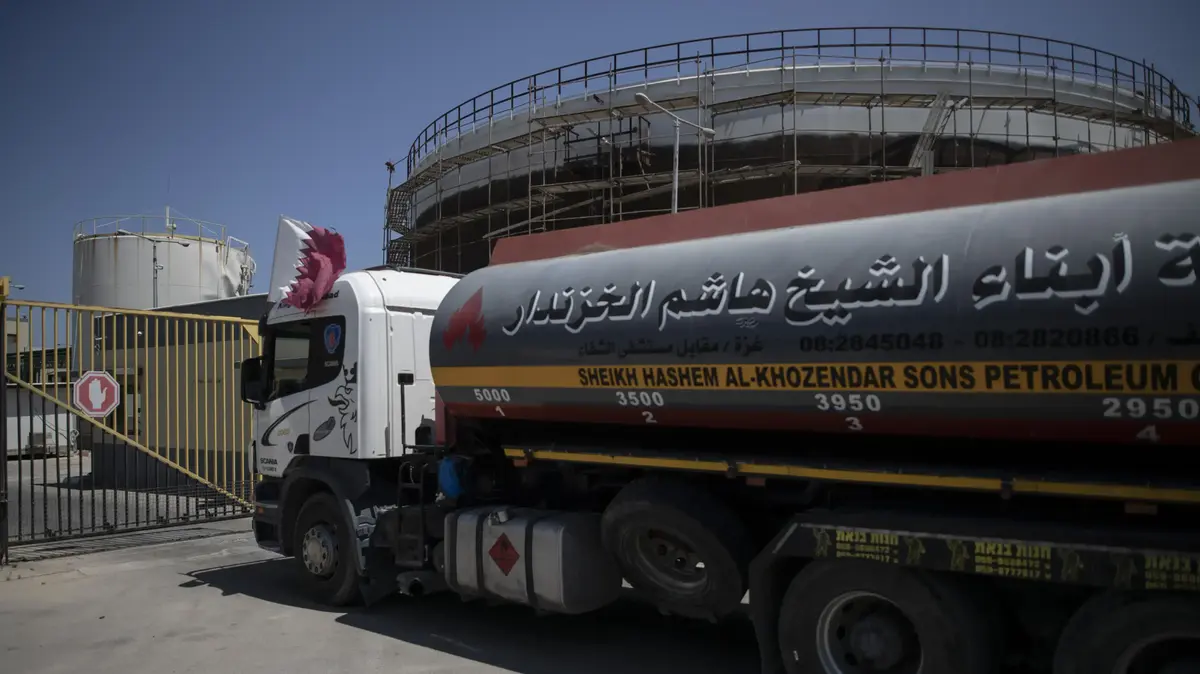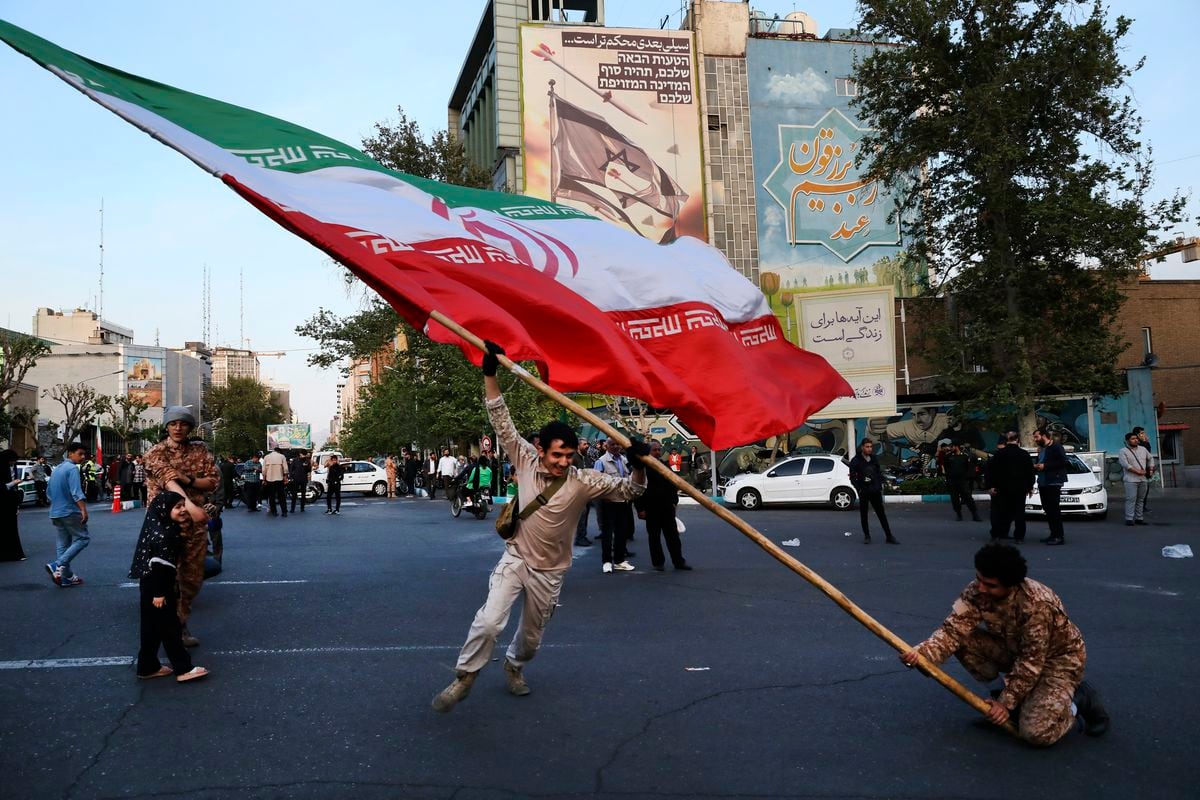news
Opinions and interpretations
New Middle East: Israel's New Map of Opportunities
The signing of the normalization agreements with the United Arab Emirates and Bahrain indicates that many Arab countries do not see Israel as an enemy.
The equation according to which the change in relations depends on the conflict with the Palestinians has given way to the realization of common interests in the delicate balance in the Middle East.
Updated forecasts
Tags
Sudan
Chad
Morocco
Saudi Arabia
Oman
Uzi Rabbi
Saturday, September 26, 2020, 8:30 p.m.
Share on Facebook
Share on WhatsApp
Share on general
Share on general
Share on Twitter
Share on Email
0 comments
Gamzo: There is no need to insist on opening a school in red cities, ...
Netanyahu: There is no agreement, even hidden, on the sale of weapons ...
Enforcement of the night curfew in red localities in the Arab sector ...
With chairs and keeping distance: about a thousand demonstrators outside the residence ...
The High Court recommends that the State Attorney's Office open an investigation into the leak ...
Elections abstained: Knesset approves law rejecting approval ...
Brother of Yaakov Abu al-Qiaan: Netanyahu should apologize ...
Lapid: The election was not canceled, on the contrary, we received a date - another 4 ...
Trump: "Our two friends Israel and Bahrain have agreed ...
Rouhani in a meeting with the chairman of the IAEA: "We will continue to cooperate" ...
Levin: High Court rulings tear Israeli society apart ...
Violent night in Balfour: 30 protesters arrested, 3 policemen ...
In the video: The signing ceremony of the agreement with the United Arab Emirates and Bahrain (Photo: GPO and Reuters, Editing: Itai Amram)
The year 2020 will probably be remembered as one of the most difficult years in the Middle East and the world because of the corona crisis and the hardships imposed by the plague.
But this year a revolution has taken place before our eyes full of hope and faith, which has decisive historical significance in another sector.
These are the normalization agreements between Israel and Arab countries, which, in addition to the fact that they have a value in their own right, also indicate a dramatic regional change.
They indicate that more Arab countries do not see the State of Israel as an enemy, but a partner, and identify many common interests.
The equation that has talked for decades about applying regional change solely from the point of view of resolving the Israeli-Palestinian conflict is no longer relevant.
Its place is taken by various countries that stand on the map of opportunities, which could change the face of the Middle East for many years.
More on Walla!
NEWS
Negotiations between the United States and Sudan regarding normalization with Israel ended without a breakthrough
Morocco: Reject any possibility of normalization with Israel
The next wave of masks: more comfortable, beautiful and protective - at a special discount for Walla!
Walla!
NEWS Image processing
Sudan
Population:
About 44 million inhabitants
The ratio between Sunnis and Shiites: The
majority of the population is Sunni Muslim (97%).
Minority of Christians and Tribal Beliefs
Leading
Industries
:
Agriculture, Oil Produced Mostly in South Sudan, Separated from the State in 2011
Relations with Israel Today:
During Tyrant Omar al-Bashir's
Day
Weapons and weapons made their way to jihadist organizations in Sinai or to Hamas and Islamic Jihad in Gaza.
Following his ouster, his successor al-Burhan met with Prime Minister Benjamin Netanyahu in Uganda in February 2020. At this meeting, the leaders agreed to promote relations in exchange for Israeli planes making their way to South America to be allowed to fly over Sudan airspace.
Khartoum hopes that in return, Israel will work to remove the restrictive American sanctions imposed on Sudan in the days of al-Bashir.
The prospects for normalization:
Although diplomatic relations with Israel appear to be good for Sudan, mainly due to the removal of US sanctions and the rapprochement with the West, it seems that the friction between the political arm and the military arm under its leadership may delay the signing of an agreement.
Sudanese Prime Minister Abdullah Hamdukh has claimed that the new Sudanese government is a caretaker government and therefore has no mandate to normalize state relations with Israel.
However, it seems that the economic and security constraints that Sudan is facing will sooner or later tip the scales in favor of a normalization agreement with Israel.
Walla!
NEWS Image processing
Chad
Population:
About 16 million
Sunni-Shiite ratio:
Slightly more than half of the population is Sunni Muslim.
The rest of the population is Christian or has local tribal beliefs and
leading industries:
mainly agriculture.
In recent years, there has been a certain revival in the regulated export of oil and other natural resources, such as uranium, potassium and other
relations with Israel today:
starting in 2016, contacts between the two countries were re-established through reciprocal visits to Benjamin and Jerusalem.
It is important to note that until 1972, diplomatic relations existed between Chad and Israel.
Today, Israeli planes are allowed to pass through the airspace of Chad on their way to South America.
In addition, there is intelligence-security cooperation to thwart the actions of Iran and its affiliates in West Africa.
In addition, humanitarian and health assistance is provided by Israel to Chad in its war against the corona plague and natural disasters that have recently befallen the country.
The prospects for normalization:
Chad is a desert country, poor and plagued by terrorism by jihadist Salafi organizations.
It craves Israeli technologies, aid in agriculture and water, and security and intelligence assistance.
A Chad government official recently pledged to open an official diplomatic mission in Jerusalem, although the Foreign Ministry in Chad has denied the allegations, saying it has no intention of doing so.
Even in the case of Chad, the challenges of reality may prevail in favor of reaching a normalization agreement with Israel.
Walla!
NEWS Image processing
Morocco
Population:
About 37 million
Sunni-Shiite ratio:
Most Sunni population, there is a minimal Shiite minority
Leading industries:
Phosphates, agriculture, textiles, Tourism
Relations with Israel Today:
For years Morocco has been one of the only Arab countries considered Israeli tourist friendly, and in previous years The corona is visited by about ten thousand tourists every year.
Morocco was also home to the largest Jewish community in Arab countries and this is reflected in the special relations that were forged between Morocco and Israel.
The two countries have open trade relations in the fields of agriculture, high-tech and the defense industry, among others.
In February 2019 it was reported that Netanyahu met secretly with Foreign Minister Nasser Morita margins of the UN General Assembly in New York to discuss the normalization of relations between the two countries and the joint struggle against Iran.
Prospects for normalization:
a statement given by Prime Minister Saad al-Din Osman, in response to the agreements signed between Israel The United Arab Emirates said, "We refuse any normalization with the Zionist entity because it will encourage it to continue to violate the rights of the Palestinian people." Other sources say the Moroccan government is considering normalizing relations with Israel in exchange for American backing. In the international dispute - Western Sahara,
despite Israel's long - standing relationship with Morocco in various areas, the chances of a full normalization agreement do not appear to be great in this reality, and it is not impossible to see improved relations in other areas, but not by signing an agreement similar to Israel.
More on Walla!
NEWS
Crucial tripartite meeting: Sudan is considering agreeing to normalize with Israel
To the full article
Saudi Arabia
Population:
About 35 million
Sunni-Shiite ratio:
The Saudi population and the Saudi monarchy are among the conservative Sunni Lahavi sect, which is very hostile to Shiite Islam and the great Shiite state on the other side of the Persian Gulf - namely Iran.
In Saudi Arabia, there is a significant Shiite minority (about 15% of the population), some of whom protested in the "Arab Spring" against the Wahhabi monarchy.
Leading industries:
oil, gas, phosphates, tourism - mainly Hajj, pilgrimage to the holy places of Islam in the cities of Mecca and state
Relations with Israel today: The
common interests of the countries are derived from a common vision regarding the identity of the enemy in the region - Iran.
Over the years, cooperation has developed between the two countries in various fields, but most of them have remained "under the radar" for reasons of political correctness and Saudi political tradition.
In recent years, relations have changed, with the heir to the throne and Defense Minister Muhammad bin Salman declaring that he recognizes Israel's right to exist.
Indeed, recent warming has been seen in the media, academia, the economy and even security.
The kingdom also decided in a dramatic move to allow Israeli planes to pass through its airspace on their way east, and it was they who gave the green light to its protectorate, Bahrain, to sign a normalization agreement with Israel.
The prospects for normalization:
As a country that carries the Shahada (Declaration of Islamic Faith) on its banner and has two of the holiest sites for Islam (Mecca and al-Madinah), it is difficult to see a full Saudi move for a normalization agreement with Israel.
There are also disagreements between the "old generation" led by King Salman who supports the Arab boycott of Israel and the Palestinians' demand for an independent state and claims that his kingdom is "determined to achieve a fair and permanent solution to the Palestinian issue" and the regent, who sees Israel as a partner It has an important place in Saudi Arabia's future plan "2030".
Muhammad bin Salman, who sees Iran as a real enemy and expresses this in his statements and policy tools, understands the Israeli-American connection as a strong support for the future to come.
Israel is also an effective partner in the 21st Century Parade as it can provide solutions to the post-oil industries and help Saudi Arabia move to the fields of advanced technology.
The agreement signed between Bahrain, the small kingdom sheltered in the shadow of Saudi Arabia, and Israel can be seen as a Saudi advance payment under a broader US-Saudi plan for the region and bilateral relations.
Even in the case of Saudi Arabia, full normalization with Israel is difficult to carry out in view of the fundamental features of the kingdom and the frictions at the top.
However, over the years and with the full arrival of Muhammad bin Salman or any of the third generation to the throne, relations are expected to tighten and may even reach full normalization.
Walla!
NEWS Image processing
Oman
Population:
About 5 million
ratio of Sunnis to Shiites:
Most of the residents belong to the Abadia sect, a moderate Muslim community that differs from the Shiites and Sunnis Leading
industries:
Oil and gas, agriculture and fisheries
Relations with Israel today:
Sultanate of Oman Open "for the time being.
Thus, the sultanate was able to maintain complex and interesting relations with the Islamic Republic of Iran, but at the same time maintained under the radar relations with Israel on security, military and civilian life spheres.
She sees the strategic benefits inherent in a normalization agreement with Israel, but also understands that taking sides could create antagonism in relations with Iran, which is why she is pondering this issue.
The prospects for normalization:
Oman has justifiable reasons to make the relationship with Israel more clear and formal.
As someone who thinks of the "day after" oil, just like the United Arab Emirates and Bahrain, she will find in Israel a reliable and quality partner in creating an economy that strengthens the non-petroleum sectors and the high technology and futuristic trends in which Israel excels.
It is likely that the Sultanates of Oman will sooner or later join the move taken by the United Arab Emirates and Bahrain.
Professor Uzi Rabbi is the head of the Dayan Center for Middle East and African Studies at Tel Aviv University
Share on Facebook
Share on WhatsApp
Share on general
Share on general
Share on Twitter
Share on Email
0 comments









